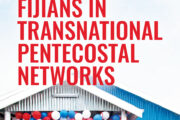A devout Southern Baptist relative, now deceased, astonished me when I was a boy with her ability to recall obscure passages from Scripture.
“Deuteronomy 2:26!” I’d say after flipping randomly through the onionskin pages of her well-thumbed King James Bible.
Face aglow and eyes shining, she’d reply, “And I sent messengers out of the wilderness of Kedemoth unto Sihon, king of Heshbon.”
Unfortunately for my relative’s kids, her religious ardor did not always translate into maternal warmth. In fact, she was often rigid and even intolerant in her efforts to fit her three children into the spiritual molds that she had chosen for them.
Vern Bengtson, a CRCC Senior Fellow and emeritus professor of gerontology at USC, might have accurately predicted that none of my relative’s children would take up the torch of her faith. As part of a CRCC research initiative with funding from the John Templeton Foundation, Bengtson and three USC colleagues sifted through data from a 35-year longitudinal study of several hundred Southern California families to construct the sociological backbone for their book Families and Faith, an examination of how religion is transmitted—or not—across generations.
News media outlets ranging from Christianity Today, Religion News Service and the Wall Street Journal have picked up on some of the study’s most important findings: About 6 in 10 children will adopt their parents’ beliefs as adults, a figure that has remained surprisingly constant since the 1970s. Grandparents exert a stronger influence on religious adherence among younger generations than Bengtson and his team had anticipated. And most of the “Nones”—the growing ranks of Gen Xers and Millennials who tick “none of the above” on religious identification surveys—aren’t apostates. More often they’re simply following in the spiritual-but-not-religious footsteps of their Baby Boomer parents.
But the most insightful component of the study homes in on the relationship between religiosity and emotion. At the top of his interview with the Christian Century, Bengtson says that emotional warmth rather than devoutness or discipline appears to be the key factor in families that successfully transmit religious traditions across generations. Allowing their children—particularly adolescents—to venture away from orthodox expressions of belief might seem counterintuitive to parents who want their kids to remain in the fold. Yet Bengtson’s work shows that a home environment that is nurturing but not constricting appears most likely to encourage spiritual roots to grow deep.
It’s not a stretch to imagine the agnostic Boomer son of my deceased Southern Baptist relative remarking drily, “Really? What a shock.” Easy enough to say in hindsight, but not so obvious in the thick of family life. The message of Families and Faith, to paraphrase I Corinthians 13:13, is that if parents want to honor faith and cherish hope for their children, the best strategy is simply to love them as selflessly as they can.
Photo Credit: S P Photography/Flickr
Nick Street was a senior writer with the USC Center for Religion and Civic Culture.








